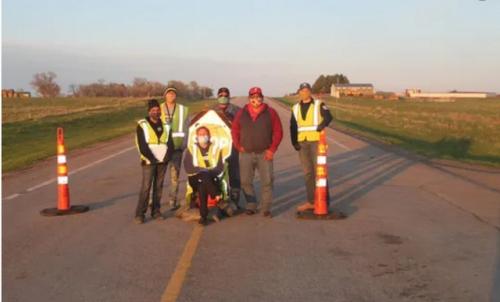On South Dakota’s Sioux Reservations, Checkpoints Save Lives
- Opinión

A standoff over safety and sovereignty is intensifying in South Dakota. Two Indigenous tribes there, the Cheyenne River Sioux and the Oglala Sioux, established checkpoints on roads leading into their territories, ensuring all those seeking entry onto tribal lands are traveling for an approved, essential reason and don’t exhibit symptoms of COVID-19. On Friday, Republican South Dakota Governor Kristi Noem, one of only eight governors nationally who refused to issue a stay-at-home order, demanded they remove the checkpoints or face state government intervention. The checkpoints remain in place.
“The main purpose of these checkpoints is to keep our people safe,” Harold Frazier, the elected Cheyenne River Sioux Tribe chairman said Tuesday on the Democracy Now! news hour. “With our population, with our lack of medical facilities, we look to our relatives to the south, the Navajo Nation, and see what’s going on there. That could easily be us,” he added, commenting on the massive COVID-19 outbreak on the Navajo reservation. The Cheyenne River Sioux reservation has eight beds in its clinic, and no Intensive Care Unit. The nearest hospital, in Rapid City, is three hours away.
Oglala Sioux Tribe President Julian Bear Runner explained his decision to create checkpoints in a Facebook live video, saying, “Governor Noem miscalculates our level of dedication to protect our most vulnerable people from crony capitalism, threats to force us to open our economy as they chose to. There is no way to place a value on what we have to lose if we let them insult us this way. My relatives, we have been here for millions of years. Whatever they brought to our lands has proven to be poison.”
Governor Noem is a staunch ally of President Trump, and a frequent guest on the rightwing Fox News Channel. Applauding the largely white, heavily-armed groups protesting stay-at-home orders in several state capitals in April, Noem told Fox News host Laura Ingraham, “So many people give up their liberties for just a little bit of security and they don’t have to do that.”
Even though South Dakota currently has one of the fastest growing infection rates in the U.S., Noem is promoting a return to “normal,” risking a surge of COVID-19 deaths. Sioux Falls, SD is home to a massive Smithfield Foods slaughterhouse, where 3,700 workers “process” close to 20,000 hogs daily. That plant became the most intense COVID-19 hotspot in the country. Of the state’s 3,723 confirmed positive cases and 39 deaths, 3,017 of them and 34 of the deaths are from Minnehaha County, home to Sioux Falls and the Smithfield meatpacking plant.
Gov. Noem rejected pleas from local elected officials, workers and union leaders to close the plant, relenting only when the outbreak became too huge to ignore. Then, on April 28th, President Trump signed an executive order invoking the wartime Defense Production Act, preventing state and local governments from closing meatpacking plants. The Smithfield plant reopened on May 7th. The number of coronavirus infections is still climbing.
“Our ‘Back to Normal’ plan doesn’t include new government programs, more red tape, proscriptive phases, tight controls, or anything of the like,” Noem said in a statement. “Our plan continues to put the power of decision-making into the hands of the people – where it belongs.”
Noem’s stalwart defense of liberty, however, stops at the reservation boundaries. She supports armed white vigilantes who threaten Democratic governors in states like Wisconsin. But if Native Americans dare to protect public health on their sovereign territory, Gov. Kristi Noem suddenly becomes a fan of Big Government.
The checkpoints work, by the way. One person stopped responded that they had been in a known COVID-19 hotspot, which tribal authorities duly noted. Not long after, she reported feeling ill, and within eight hours had a positive COVID-19 test result. Tribal health officials performed rapid contact tracing and quarantined those who had been near the infected individual. The data collection at the checkpoint expedited the response and, hopefully, prevented further spread of the virus. The Ogala Sioux have just reported their first case this week, and immediately imposed a reservation-wide, one day curfew.
These two tribes, part of the Oceti Sakowin people, are no strangers to the depredations of white settlers. “The love of possessions is a disease in them,” Sitting Bull observed in 1877. “They claim this mother of ours, the Earth, for their own use, and fence their neighbors away from her, and deface her with their buildings and their refuse…All this is sacrilege.” The Cheyenne River and Oglala Sioux are doing all they can to stop the coronavirus from impacting their reservations. Their efforts at self-protection and mutual aid themselves are spreading, however. The Omaha Nation, not far to the south in Nebraska, has just established check points of its own.
The original content of this program is licensed under a Creative Commons Attribution-Noncommercial-No Derivative Works 3.0 United States License. Please attribute legal copies of this work to democracynow.org
Del mismo autor
- Putin’s war on Ukraine could spark a nuclear catastrophe 04/03/2022
- La persecución de Biden contra Julian Assange 18/01/2022
- Biden’s persecution of Julian Assange 06/01/2022
- ¿Reconstruir mejor o construir más bombas? La elección es clara 13/12/2021
- Facebook Papers: cumplicidade no ódio, nas mentiras e na violência 28/10/2021
- Es hora de eliminar a Facebook de nuestra lista de amigos 11/10/2021
- El espía que se metió en tu teléfono 20/09/2021
- De Kabul al río Bravo, Estados Unidos crea crisis de refugiados 31/08/2021
- Después de décadas de guerra, el pueblo afgano merece la paz 23/08/2021
- Código rojo: la emergencia climática exige una acción inmediata 16/08/2021
Pandemia
- Gabriela Ramírez Mendoza 07/02/2022
- Jyotsna Singh 06/02/2022
- Gabriela Ramírez Mendoza 06/02/2022
- Richa Chintan 10/01/2022
- Isaac Enríquez Pérez 03/01/2022
